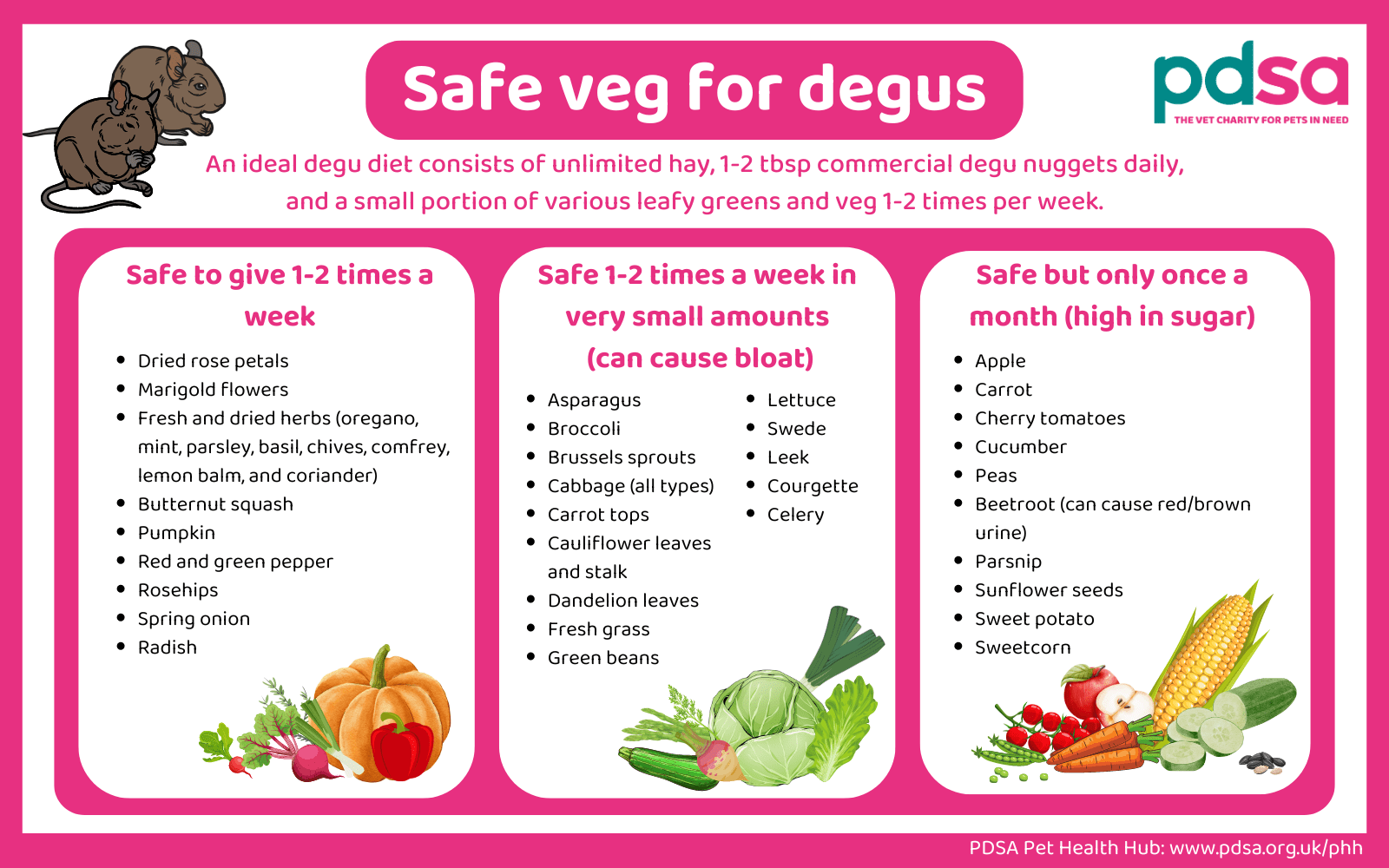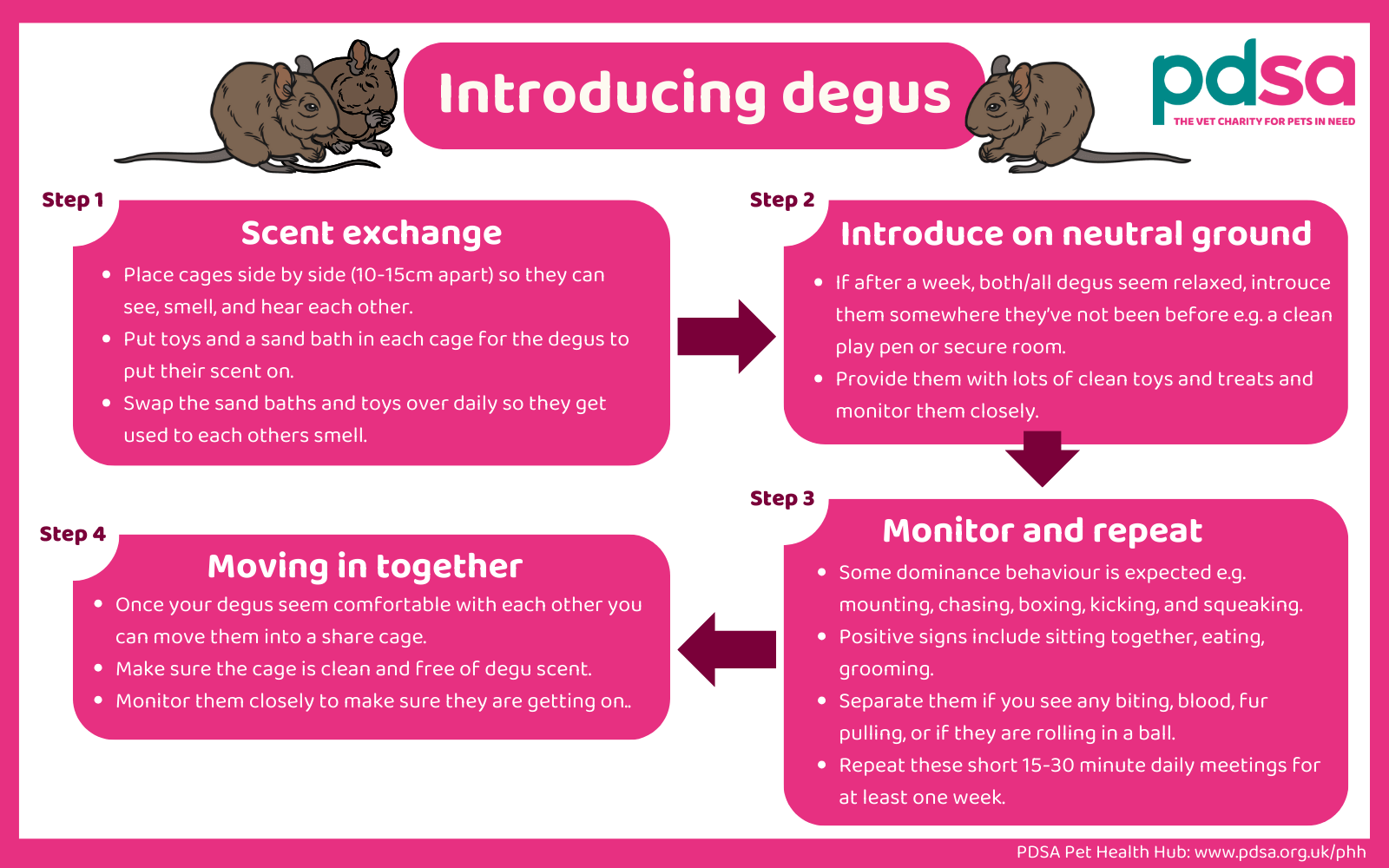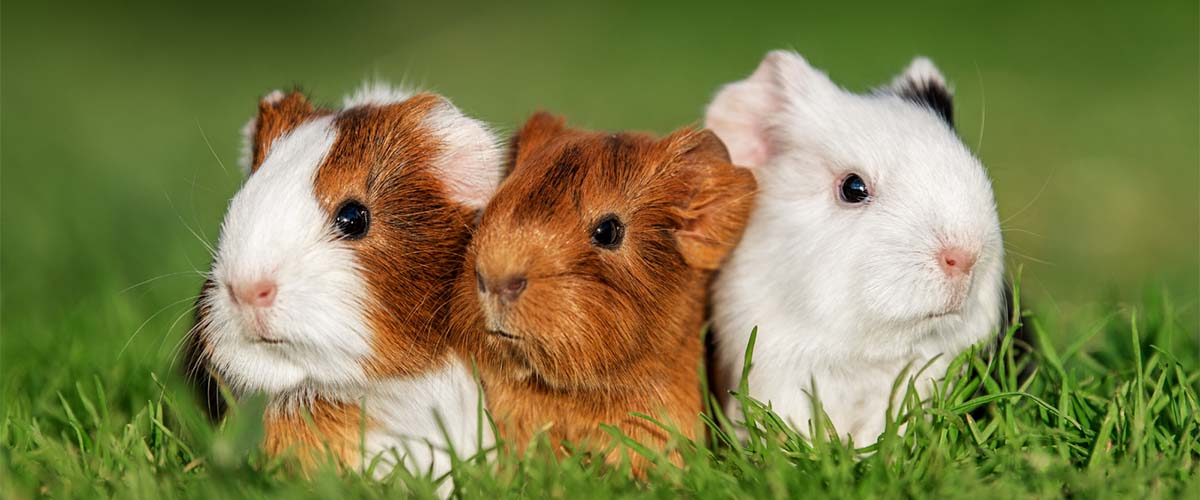
Degus are lively and entertaining creatures that can make great little pets for the right owner. Like many other small mammals, they don‘t like being handled or picked up. But if you’re patient, it’s likely they’ll take a treat from your hand. Degus are diurnal, meaning they are awake during the day and asleep at night. They can also be very vocal – squeaking and chirruping throughout the day.
Do degus need to live in pairs or groups?
Degus are social pets that need the company of other degus to be truly happy. You’ll need to keep your degus in pairs or small groups. To limit the risk of fighting, stick to same sex groups or one castrated male with one or more females.
If you have a pair of degus, and one dies, it’s possible to introduce a new degu, but this must be done carefully and with lots of patience as they can be extremely territorial – read more below about introducing degus. The more degus you have the more space they will need.
What do degus eat?
Degus are herbivores, meaning they only eat plant material. They are also very prone to diabetes so they need a diet that’s high in fibre and low in sugar and fat.
An ideal degu diet includes:
- Good quality hay: degus need constant access to an unlimited amount of good quality hay. This should make up the majority of their diet. The fibre in hay maintains gut health and helps wear down their constantly growing teeth.
- Commercial degu food: pet degus also need one to two tablespoons (10g) of commercial degu nuggets daily. If you can’t find degu nuggets then they can also have chinchilla or guinea pig nuggets, just make sure they don’t contain molasses (which is high in sugar). It’s best to scatter your degus nuggets throughout their cage instead of putting them in a bowl to mimic how they would naturally find their food in the wild.
- Leafy greens and vegetables: degus should have a small portion of fresh leafy greens and vegetables one to two times a week (no more). It’s important to wash the veg beforehand, give them a variation, and follow our safe veg list below.
- Fresh water: your degus will need a constant supply of fresh water, replenished daily.
Important
- Avoid giving your degus anything high in sugar such as fruit (an occasional bit of apple is ok), sugary rodent chews, or any commercial rodent diets containing molasses. Also avoid rabbit food, hamster and gerbil food (too much protein), or any human food scraps.
- Introduce any new foods slowly to avoid upsetting their stomachs.
- Keep an eye on your degus eating and drinking habits, and contact your vet if you notice any changes.

Housing
Degus are lively creatures that need lots of space! Ideally the bigger the cage the better. A tall multi-level cage is the best option, as degus love to climb. Pet shops often sell multi-level enclosures for ferrets or chinchillas which can be appropriate – just make sure they can’t fit through the gaps between the bars. It’s also really important that the cage is metal as degus can easily chew through plastic and wood.
Ideal cage checklist:
- Size: as large as possible - degus need lots of space to run, jump and climb.
- Space to dig: degus are keen diggers, so they need a deep layer of hay, shredded paper and a dust-free absorbent bedding at the bottom of their cage.
- A roof: degus are prey animals and so prefer a solid roof (that they can’t see-through) to feel safe.
- Multiple levels: degus are keen climbers so make sure their cage has lots of levels, ramps and platforms.
- Nesting areas: your degus will need nest boxes to hide and sleep in, they’ll love filling the boxes with hay all by themselves!
- A place to run: your degus will enjoy a large, solid exercise wheel to run in. Just make sure it’s large enough to allow them to run with a flat back (running with an arched back can cause spinal issues).
- Location: the cage should be placed indoors, out of draughts and direct sunlight. Keep them away from TVs or music systems as the vibrations can make them stressed.
Essential: degus also need time outside of their cage to exercise. Half an hour or more a day is ideal. Find a large exercise pen or secure room to let them out in. Remember that degus love to chew so cover up any wires or exposed wood.
Cleaning
It’s important to clean out your degus cage often to make sure it is a safe and hygienic place for them to live. Degus don’t tend to smell as much as some other small pets but they still need regular cleaning.
- Spot clean every day removing any soiled bedding and uneaten food.
- Deep clean fortnightly removing all bedding, toys and levels from the cage. Clean everything with a pet safe disinfectant.
- Always put some old (unsoiled) bedding back after a deep clean so that your degus don’t get stressed from losing the scent of the cage.
Degu enrichment
Degus love to keep busy so it’s important to provide them with lots of space, toys and activities to keep them happy.
Ideas:
- A separate deep filled box with potting soil will allow them to create tunnels and burrows
- Branches to chew and climb on - apple, pear, and willow are all safe
- Cardboard tubes and boxes
- Wood bridges, tunnels and platforms
- Scatter feeding will encourage natural foraging behaviour
- Degus love a sand bath! Giving them a shallow tray of chinchilla/hamster sand a few times a week will allow them to keep their coat clean. Don’t leave the sand in all the time as their skin may become overly dry.

As a prey animal, degus can be very nervous about being picked up. They usually prefer to be petted/given treats in their cage. However, if you’d like your degus to be less nervous about being handled, you’ll need to start picking them up from a young age.
Degus can be jumpy and fast moving so it’s really important to handle them carefully. Picking them up roughly could injure them – and they might bite you if they become frightened.
The best way to pick up a degu:
- Place one hand around their chest area
- Lift and support their hind legs with the other hand
- Hold them close to your body for security and keep them close to the ground in case they fall
- They can also be picked up by allowing them to run into a tube and then placing the tube near your arm/hands and allowing them to walk out
Never pull or pick up a degu by their tail – they can ‘drop’ a portion of their tail as a defence mechanism if they’re scared, which can be very painful for them.
Degu health
It’s important to monitor your degus closely for signs of illness and contact your vet ASAP if you notice anything unusual.
Common health problems in degus include
- Tooth problems: tooth problems can occur in degus because they have continuously growing incisors (front teeth) and cheek teeth (back teeth) that must be worn down through their diet. A poor diet lacking enough hay is one of the main causes of dental disease. Symptoms of a dental disease include drooling, a swollen face, one or both eyes discharging and a change in tooth colour.
- Diabetes: degus are prone to diabetes when they are fed an incorrect diet high in carbohydrates and sugars. Symptoms include cataracts (eyes go cloudy), excessive drinking, excessive weeing, and obesity.
- Tail slip: this is when a degu loses a portion of their tail either from extreme fear, or poor handling. If this happens you must take them to a vet ASAP as they will likely require amputation to stop the infection from spreading.
- Respiratory disease: dusty bedding, a poorly ventilated cage and a dirty enclosure can all lead to respiratory infection and irritation. Symptoms include discharge from the eyes and nose, sneezing, difficulty breathing and reluctance to eat.
Introducing new degus to each other
Introducing degus to one another can be a delicate process which requires patience and supervision to be done safely. Remember, before making new introductions you must keep groups of the same sex, unless you have a castrated male, which you can keep with one or more females.
How to introduce:
- Step 1: Place the new degu/s and the old degu/s side by side in separate cages. They should be roughly 10-15cm apart, so that they can smell, see and hear each other but not bite.
- Step 2: Give each set of degus their own bed, toys and sand bath. Swap these over daily so that they get used to smelling each other’s scent.
- Step 3: Continue doing this for a week or two. If they try and fight through the bars and seem uncomfortable keep going and widen the gap before gradually reducing over time.
- Step 4: Once the degus appear comfortable i.e. sleeping close to each other then they are ready to meet.
- Step 5: Let them meet for 15-30 minutes in a neutral area with lots of treats and clean toys. Signs they are happy include grooming, sitting close to each other, eating, and following each other around. If you see any of the following, separate them immediately and try again another time: rearing up at each other, constant teeth chattering, fur pulling, blood, biting, rolling around fighting in a ball. Continue these short meetings daily for a week.
- Step 6: Once you get to a point where the degus are meeting regularly and seem comfortable you can then move them into their permanent (fully clean so no scent) home.
Troubleshooting: if meets continually end in fighting it means your degus probably aren’t compatible. This is common as degus can be very territorial animals. You can’t force them so it’s best to stop trying as they may get stressed.

I have just seen my degu eat their poos, is this normal?
Yes! This is completely normal and an important way for them to get the nutrients they need and keep a healthy digestive system.
Are degus a good beginner pet?
Degus require a lot of daily time and attention so are a big commitment! They also need a lot of space and a controlled diet in order to keep them happy and healthy. Therefore they may not be the best beginner pet.
Hamsters as pets
Thinking of adopting hamsters as pets? Our in-depth guide will answer all your questions.

